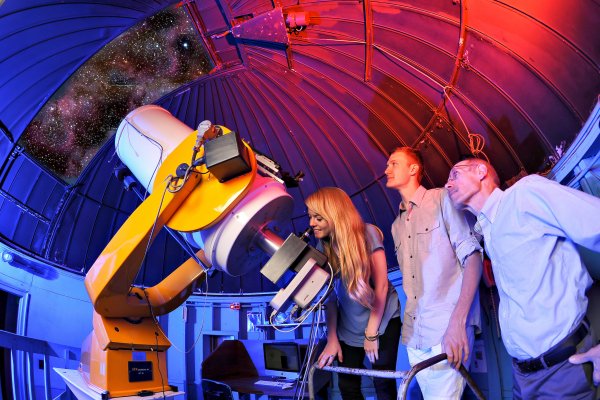32-hour B.S. in Physics
This flexible degree plan can accommodate a variety of interests, and electives can be selected to prepare students for several career paths with concentrations in fundamental or applied physics. Students who pursue this degree adopt one of the following options:
- a stand-alone major in physics, achieved by completing at least eight additional credit hours in physics;
- a second major in a non-science discipline;
- the 32-credit complementary major in environmental science;
- a disciplinary science minor (qualifying disciplines include astronomy, biology, chemistry, computer science, engineering, geography, geology, mathematics, meteorology, and psychology); OR
- a minor in fundamentals of business, business administration, applied statistics, engineering, or geographic information systems.
In addition to completing the required courses, students are encouraged to take advantage of any of the many research opportunities available at Valpo. Students who pursue a concentration in applied physics are especially encouraged to take advantage of the Cooperative Education Program, which awards credit for approved professional work.
Foundations
B.S. students in physics at Valpo must complete the general-education requirements for the B.S. This University-wide core strengthens communication and critical-thinking skills while introducing the student to global cultures and traditions. General-education requirements for the B.S. (PDF) »
Requirements for the Major
The following courses constitute the minimum 32 credits required for the major. Further courses may be required for students pursuing concentrations in fundamental physics or applied physics.
It is assumed that students will acquire competency in at least one computer programming language (FORTRAN, C, C++).
| Core Courses | 28 credits | ||
| PHYS 141 | Newtonian Mechanics | 3 credits | |
| PHYS 141L | Experimental Physics I | 1 credit | |
| PHYS 142 | Physics: Electricity, Magnetism, and Waves | 3 credits | |
| PHYS 142L | Experimental Physics II | 1 credit | |
| PHYS 243 | Physics: Atoms and Nuclei | 3 credits | |
| PHYS 245 | Experimental Physics III | 1 credit | |
| PHYS 246 | Data Reduction and Error Analysis | 1 credit | |
| PHYS 250 | Mechanics | 3 credits | |
| PHYS 281 | Electricity and Electronics | 3 credits | |
| PHYS 345 | Experimental Physics IV | 1 credit | |
| PHYS 360 | Thermal Physics | 3 credits | |
| PHYS 371 | Electromagnetic Fields | 3 credits | |
| PHYS 445 | Senior Research in Physics (With departmental approval, PHYS 481-483 or PHYS 497 may be substituted.) |
2 credits | |
| PHYS 499 | Physics and Astronomy Colloquium | 0 credits | |
| Electives | 4 credits | ||
|
Four credits from courses numbered 200 and above, not to include more than one credit of PHYS/ASTR 492, Research or Reading in Physics |
|||
| TOTAL | 32 credits | ||
| Additional Recommended Courses: | |||
| One year of chemistry | |||
|
PHYS 490 |
The Scientific Endeavor | 3 credits | |
